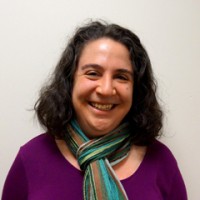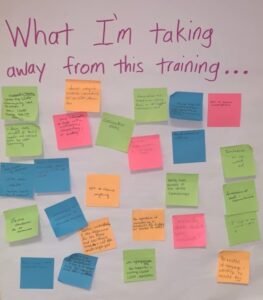
03 Mar 2021
Get to Know Our Expert Trainers – Alex Kent
We sat down with SAGECare Trainer, Alex Kent, and asked her five questions.
How and why did you get started as a SAGECare certified trainer?
I was on staff at SAGE in New York in 2010, when the National Resource Center was founded and the management training curriculum was initially developed. I had always wanted to do training, so I was thrilled to be invited to participate in the very first train-the-trainer session. Since this was the first time the curriculum was put on its feet, the multi-day workshop involved leaders in LGBT aging from all over the country. Many of the people I met in that workshop remain great friends and colleagues to this day.
What is your background?
Believe it or not I was a playwriting major in college. My amateur theater background actually serves me very well when I’m training – in some ways it’s a lot like performing, just on a different kind of stage.
I have always been involved in LGBT community work though. By the age of 15 I was running my high school’s Gay-Straight Alliance (one of the first in the country!), and speaking regularly to high school health classes about what it was like to be gay. I helped to run the LGBT group on my college campus, and then a social group for LGBT 20-Somethings in New York City, before deciding I wanted to pursue this kind of work professionally. I went back to school for a Master’s in Public Administration, where I learned all about nonprofit management, but also had the opportunity to make important connections to people in the field.
My first “Gay for Pay” job was at the LGBT Community Center in New York City, which at the time also housed SAGE’s program office and drop-in center. My connections there led to my first job at SAGE, as the Program Manager in the Community Services department. This was well before SAGE New York opened its senior centers, so our department was similar to a senior center in many ways. I interacted daily with our community of LGBT older adults, and from that I built a foundation of hands-on knowledge and understanding that I still draw on regularly.
What is the best story you can provide from your experience as a trainer?
Oh my goodness, where to even begin. Some of my best memories are from working with other members of the training team – there was a marathon of four four-hour trainings in two days at a Delaware casino with Tim Johnston, and a memorable lunch break trip to Subway during an all-day training in D.C. with Lisa Krinsky. I got to train the full staff of a continuing care community right down the street from my home in Maryland – and two years later, my in-laws moved there. I once had the CEO of a large health care center tell me “You know, I’ll be honest, I was kind of dreading having to sit through a four-hour training, but this was fun!”
One time I had a particularly large group, and at the very end of the training I realized we wouldn’t have enough time for participants to share their takeaways from the day. I decided to have them write on post-its instead, and stick them onto a large sheet of paper on their way out of the room. I loved the result so much that I’ve now added it to almost all of my in-person trainings. Among other things, It creates an amazing visual that always serves as a clear reminder of why this work is so important.
I’ve witnessed so many lightbulbs go off in people’s heads, listened in on so many robust, thoughtful discussions during group work, and gotten wonderful, appreciative feedback from participants. Every training is its own unique, special experience because of the people who so willingly bring themselves to the work. I love getting to know each group throughout the training, even if it’s only an hour-long session. Spending that time together, taking them on that journey – it’s a deeply meaningful experience that no textbook or computerized course can ever fully replicate.
Tell us why you feel LGBT competency training is essential?
In the ten plus years I’ve been doing this, I have noticed some shifts in the initial attitudes of the providers I train. There used to be a real lack of awareness that LGBT older adults even existed – people had truly never thought about it before. When I asked “how many of you know you have at least one LGBT older adult that you work with,” I’d only see a couple of hands. Now most people seem to understand that they have LGBT people within the older adult populations they serve, even if they don’t know who those people are. I used to see a lot more resistance to the training itself, too – “why do I have to be here? this doesn’t apply to me.” Now folks are genuinely excited for the training, and eager to learn whatever they can. If there’s any resistance, it’s more along the lines of “I don’t need this, I treat EVERYONE with respect.”
And that, actually, is exactly why I think training like this is so important. Many providers have the best of intentions, but don’t truly understand what it takes to make LGBT older adults feel welcome and supported. SAGECare trainings not only help to build that understanding from within, but equip providers with the tools and best practices to make changes that really make a difference.
What advice do you have for our allies?
I often say in trainings that if those attending take just one thing from it, I want it to be this: listen to the individual you’re working with, and meet them where they are. It’s important to have a foundational understanding of LGBT terminology, history, etc., but effective person-centered care comes down to respecting the personal experiences, preferred terms, and self-defined identities that an individual relates to. Learning to put aside our preconceptions and truly listen openly to someone is a skill that most of us need some practice to be good at, but it’s something everyone is capable of doing.
Alex Kent, MPA, she/her Columbia, Maryland

